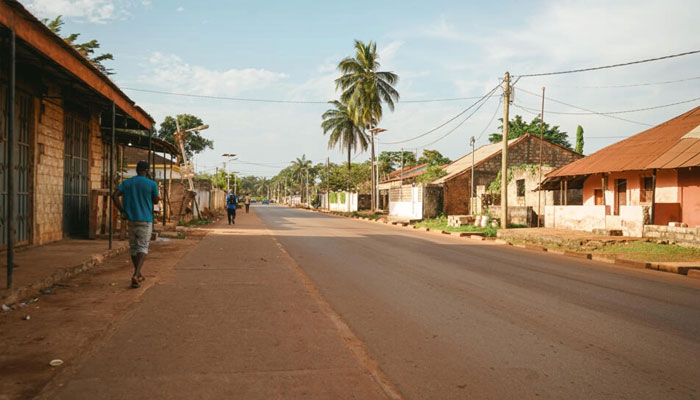Guinea-Bissau army withdraws National Guard after unrest
BISSAU: The Guinea-Bissau army ordered National Guard forces back to barracks on Saturday, following unrest that left at least two people dead and brought condemnation from the regional bloc ECOWAS.
Clashes between members of the National Guard and special forces of the presidential guard broke out Thursday night in the capital Bissau, leaving two dead.
A military official, speaking anonymously due to the sensitive nature of the situation, said six soldiers were injured in the fighting and evacuated to neighbouring Senegal.
Calm had returned by noon on Friday to the small nation with a history of instability, following the announcement that the army had captured Colonel Victor Tchongo, commander of the National Guard.
On Saturday the security presence in Bissau was reduced, but soldiers were still visible around certain strategic buildings such as the presidential palace, the judicial police headquarters and some ministries.
Some National Guard officers and soldiers fled into the interior of the country, the army said in a statement Saturday, without specifying numbers.
“The General Staff of the armed forces hereby informs them that they must return to their place of assignment,” the statement continued.
The Economic Community of West African States (ECOWAS), in a statement Saturday, said it “strongly condemns the violence and all attempts to disrupt the constitutional order and rule of law in Guinea-Bissau”.
“ECOWAS further calls for the arrest and prosecution of the perpetrators of the incident in accordance with the law,” the Abuja-based organisation added.
The regional bloc also expressed “its full solidarity with the people and constitutional authorities of Guinea-Bissau”.
A spokesman for UN chief Antonio Guterres, Stephane Dujarric, had called Friday for calm and urged the security forces and the army “to continue refraining from interference in national politics”.
Members of the National Guard Thursday evening stormed a police station to extract Finance Minister Souleiman Seidi and Treasury Secretary Antonio Monteiro, according to army and intelligence officers.
-
 Woman Jailed Over False 'crime In Space' Claim Against NASA Astronaut
Woman Jailed Over False 'crime In Space' Claim Against NASA Astronaut -
 James Van Der Beek’s Close Pal Reveals Family's Dire Need Of Donations
James Van Der Beek’s Close Pal Reveals Family's Dire Need Of Donations -
 Prince William And Harry's Cousins Attend 'Wuthering Heights' Event
Prince William And Harry's Cousins Attend 'Wuthering Heights' Event -
 Hailey Bieber Turns Heads Just Hours After Major Business Win
Hailey Bieber Turns Heads Just Hours After Major Business Win -
 King Charles' Andrew Decision Labelled 'long Overdue'
King Charles' Andrew Decision Labelled 'long Overdue' -
 Timothee Chalamet 'forever Indebted' To Fan Over Kind Gesture
Timothee Chalamet 'forever Indebted' To Fan Over Kind Gesture -
 Columbia University Sacks Staff Over Epstein Partner's ‘backdoor’ Admission
Columbia University Sacks Staff Over Epstein Partner's ‘backdoor’ Admission -
 Ozzy Osbourne's Family Struggles Behind Closed Doors
Ozzy Osbourne's Family Struggles Behind Closed Doors -
 Dua Lipa Claims Long-distance Relationship 'never Stops Being Hard'
Dua Lipa Claims Long-distance Relationship 'never Stops Being Hard' -
 BTS Moments Of Taylor Swift's 'Opalite' Music Video Unvieled: See Photos
BTS Moments Of Taylor Swift's 'Opalite' Music Video Unvieled: See Photos -
 Robin Windsor's Death: Kate Beckinsale Says It Was Preventable Tragedy
Robin Windsor's Death: Kate Beckinsale Says It Was Preventable Tragedy -
 Rachel Zoe Shares Update On Her Divorce From Rodger Berman
Rachel Zoe Shares Update On Her Divorce From Rodger Berman -
 Kim Kardashian Officially Takes Major Step In Romance With New Boyfriend Lewis Hamilton
Kim Kardashian Officially Takes Major Step In Romance With New Boyfriend Lewis Hamilton -
 YouTube Tests Limiting ‘All’ Notifications For Inactive Channel Subscribers
YouTube Tests Limiting ‘All’ Notifications For Inactive Channel Subscribers -
 'Isolated And Humiliated' Andrew Sparks New Fears At Palace
'Isolated And Humiliated' Andrew Sparks New Fears At Palace -
 Google Tests Refreshed Live Updates UI Ahead Of Android 17
Google Tests Refreshed Live Updates UI Ahead Of Android 17




